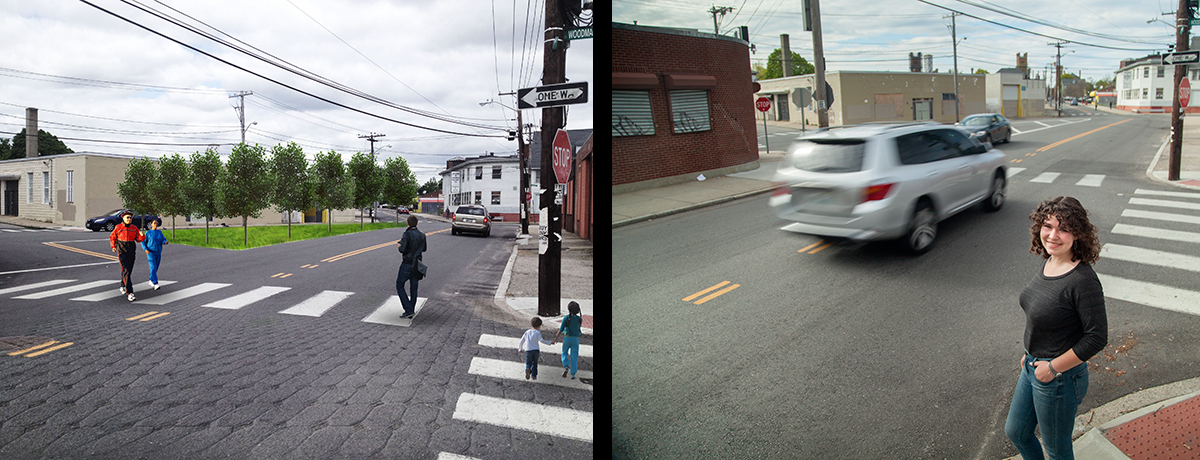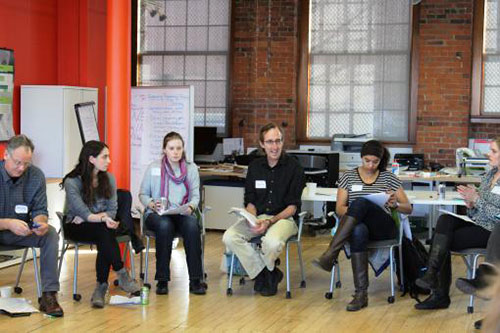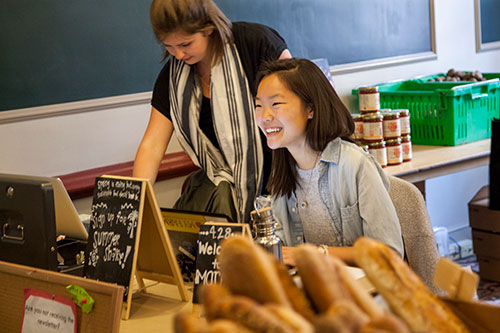
PROVIDENCE, R.I. [Brown University] — Like many high-density urban neighborhoods, the West End of Providence can get oppressively hot in the summertime. The lack of expansive green space and the prevalence of asphalt create a “heat island” effect, skyrocketing temperatures beyond those in nearby neighborhoods with more trees.
Because asphalt is impervious to rain, the neighborhood also experiences regular street flooding and unhealthy storm water accumulation. Local environmental groups worry that climate change may exacerbate all of these conditions even further.
With these issues in mind, Brown University sophomore Kai Salem, along with a team of fellow students, worked with local community members last year to identify ways to make the West End more “climate resilient” — better equipped to adapt to and mitigate the effects of climate change, like increased heat island effect and storm water accumulation.
Using community feedback, the team identified a hot, dangerous intersection in need of environmental amelioration and crafted a plan to fund and create a new green space. The project, which breaks ground this summer, will remove more than 1,000 square feet of impermeable, heat-retaining asphalt in the intersection’s center and replace it with trees and hardy vegetation. The result should be a cooler, shadier area with reduced runoff, calmer traffic flow, more green space – and in the end, a more appealing neighborhood focal point for residents.
“Our goal was to map green space, flooding, heat, and community support in the neighborhood and then use that data to develop several green infrastructure project plans. Meanwhile, we conducted case studies on the green infrastructure approaches of other cities,” says Salem “At the beginning, my work at the community level felt small and unimportant in comparison to large-scale climate impacts, but by the end of the summer I had seen the necessity of local action on climate. “
Scholars in the field
Salem’s work in the West End directly resulted from her participation in Brown University’s Engaged Scholars Program, which launched last year. The program — a collaboration between the Swearer Center for Public Service, the Dean of the College and Brown academic departments — supports students, faculty and community partners who join forces to create high-impact learning experiences that address social challenges and produce tangible public benefits.
Engaged Scholars take “engaged courses,” which focus on using research to impact social change, participate in experiential work with community partners, take part in an interdisciplinary reflection seminar and complete a capstone project. Students apply when they declare their concentration, usually at the end of their second year; their classroom studies and engaged work are integrated for the rest of their time at Brown.
The Swearer Center serves as the hub for a program that expanded from five academic departments to 12 and admitted 63 new scholars for its second year. Participating departments range from Engineering to Theatre Arts and Performance to Contemplative Studies.
Allen Hance, director of engaged scholarship at the Swearer Center, says the program’s growth is indicative of Brown student and faculty interest in coupling academic work with real-world social change.
“There are a lot of Brown students who are passionate about social justice issues and want their academic studies to be more integrally linked to those passions, which traditionally have been pursued through extracurricular and co-curricular activities,” Hance says. “The Engaged Scholars Program offers opportunities for them to be knit together more rigorously and within a community of students and professors who are working across multiple fields on a variety of issues but share that passion.”
Salem, an environmental studies concentrator, came to Brown already interested in issues of environmental justice and has explored that passion through her coursework, internships and relationships¬ she’s built by working with organizations like the Energize RI Coalition and the Rhode Island Student Climate Coalition.

Last fall, Salem participated in a Teaching, Research, Impact Lab (TRI-Lab) on “Climate Change and Environmental Justice in R.I.,” a yearlong seminar that fulfilled part of her course requirements for the Engaged Scholars Program, and an internship with Clean Water Action. Through those experiences, she conducted a neighborhood climate vulnerability assessment and, working with the team of other Brown students and community leaders, developed the green infrastructure project at the intersection of Dexter and Bucklin streets in the West End.
Salem says the Engaged Scholars Program has prompted her to weave together her efforts both inside and outside of the classroom.
“Because of the program and the support of the Swearer Center, I have the framework to see myself not just as a student in a class or an advocate outside the class, but as someone who is pulling together those threads and applying theory to the outside and vice versa,” she says.
Salem has been particularly influenced by the program’s emphasis on authentic engagement in which community needs are central and the people most impacted by projects are genuine partners in the work, she says.
“The idea of engaging meaningfully and reciprocally definitely informed how I was approaching community partners and gathering input from them,” she says. “The people who live in the West End know much more about the West End than I do. Because students are transitory and don’t know as much about the community as the people who live here, our projects can potentially end up causing more issues for the city, and they can also be a burden on the people who try to help us.”
With this in mind, Salem and the rest of the green infrastructure team called upon a variety of community engagement methods — working closely with community-based organizations, canvassing the neighborhood, holding focus groups — to assess the climate resilience of the neighborhood and select the site. They worked to secure partnerships and funding to maintain the green space long after the students involved have graduated and left the city.
“One of the goals of the Engaged Scholars Program is to give students the cultural humility they need to do this work,” Hance says. “A core concept of engaged scholarship is the co-creation of knowledge. That means there is a relationship with the community that is reciprocal and that involves a responsiveness on the part of Brown students and faculty to the needs and question of community members.”
Looking ahead
Beyond linking scholarship to impactful social change, the Engaged Scholars Program also helps students think more broadly about life after Brown.

Kaori Nagase, an Engaged Scholar and environmental studies concentrator, is interested in environmental justice work around food systems — the ways in which food travels from producers to consumers. Her coursework on the subject was complemented by her Engaged Scholars practicum last summer with Farm Fresh Rhode Island, a nonprofit that helps to increase access to healthy food by making food grown by small-scale farmers available to a wider customer base, including schoolchildren and families who receive federal food assistance.
“Working at Farm Fresh R.I. allowed me to see the things I was studying on a more macro level and apply what I’ve studied to a job context,“ Nagase says. “It has really helped me to think about what I want to do after graduation.” After Brown, she hopes to find a position related to environmental sustainability and/or food access and continues to pursue opportunities toward that end. She currently works for the Brown Market Shares Program as its communications coordinator, and this summer, she will intern with the City of Providence’s Office of Sustainability and for Rhode Island Public Health Institute’s Food on the Move program.
This big-picture thinking appeals to students and faculty alike. Hance notes that faculty interest in engaged scholarship continues to grow, and the Swearer Center hopes to expand its reach, particularly to departments in the arts and STEM fields. He expects some growing pains. For instance, there will be an increased need for coordination and advising capacity both at the Swearer Center and within departments as more students, faculty and partners get involved.
And in its outreach within the University community, the Swearer Center is working to clarify the difference between applied scholarship (the creation of technical or scientific solutions to real-world problems) and engaged scholarship (working with a community partner to solve community-specific problems).
Salem says that the University community’s rapidly growing interest in engaged scholarship is quintessentially Brown.
“Within Brown’s mission is the idea that an education here should be useful,” she says. “I really think that idea permeates Brown’s culture. Students here don’t want to learn just to learn — we want to use what we learn to better ourselves and the world around us.”